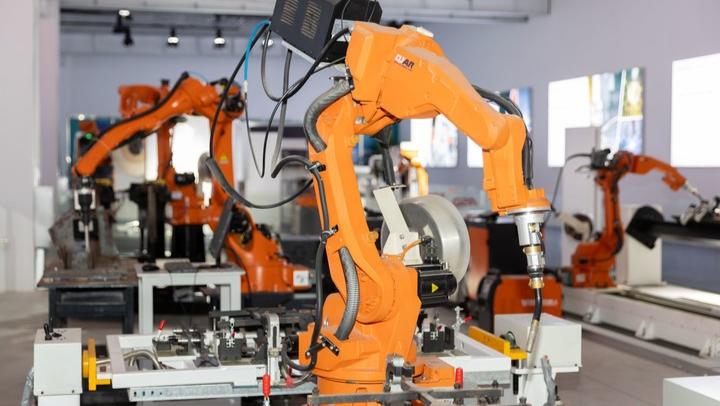
This photo taken on May 25, 2024 shows an industrial robot at ASD Robotics intelligent valley in Shanghai, east China. (Xinhua/Wang Xiang)
BEIJING, Sept. 11 (Xinhua) -- When the 2024 version of negative list for foreign investment access debuted on Sunday, China took a step further to broaden opening up to share the benefits of its development and market with the world.
With every reduction much in focus, the new list removes all restrictions over foreign investment access in China's manufacturing sector and presents to the globe another endeavor of high-level opening up.
Experts expected releasing of the new negative list to grow further foreign business communities' confidence in China market and deemed it meaningful to better pool international resources and upgrade products and services supply in China.
-- High-level opening-up in progress
Compared with the 2021 version of negative list for foreign investment access, the 2024 version deletes the two restrictive articles for foreign investment in manufacturing industries, effective from November 1, 2024.
For instance, the old version requires the controlling stakeholders of publications printing businesses to be Chinese parties and prohibits foreign investment in application of steaming, stir-frying, roasting, calcination and other processing techniques of Chinese herbal medicine pieces and production of traditional Chinese medicine products with confidential prescriptions.
After the revision, the 2024 negative list for foreign investment access contains merely 29 articles instead of the past 31 ones and hence, all the restrictive measures for access of foreign investment in manufacturing sector are abolished, said an official in charge of related affairs with National Development and Reform Commission (NDRC) on Sunday.
In China, manufacturing sector remains not only one of the earliest sectors open to foreign investment, but also a field of thorough market competition with also close connection with global industrial division of labor and cooperation.
Under such circumstances, canceling restrictions for foreign investment access in manufacturing industries points to China's activity in seeking broader international cooperation and explicit support for economic globalization.
In recent years, China has been widening access for foreign investment. From 2017 to 2021, the national and free trade zone (FTZ) negative lists for foreign investment access were revised for five consecutive years, and the restrictive articles on the two lists were reduced from 93 and 122 to 31 and 27 respectively.
All of these represented a series of opening-up measures of notable significance in China's manufacturing, mining, agriculture, and finance sectors and zero restriction for foreign investment access in manufacturing industries in FTZs as early as in 2021.
Together with the new negative list, China adhered to the principle of opening up and improved its opening-up capabilities in enlarging global cooperation through leveraging its super large domestic market.
Against the backdrop of changing internal and external circumstances, releasing of the 2024 negative list is likely to increase quality products and services supply, boost healthy competition and provide a larger space for transnational corporations to develop in China, said the NDRC official.
-- Greater confidence in China's market
What's noteworthy, debut of the new version of negative list for foreign investment access also marks China being a forerunner in terms of opening up its manufacturing industries to foreign investors in the world.
Currently, almost all developing countries have imposed restrictions over foreign investment access in their manufacturing industries and some developed economies still maintain certain restrictions for foreign investment access in manufacturing sector.
From this perspective, China's manufacturing sector opening-up stands ahead of not only developing countries but also part of developed economies and bears testimony to China fulfilling its promise that its door of opening-up will never be closed but be opened wider, said Ji Jianjun, a researcher at the Academy of Macroeconomic Research.
In the future, NDRC and other related Chinese regulators vowed to ensure the timely implementation of work in relation to the 2024 version of negative list for foreign investment access.
Li Dawei, a researcher at the Academy of Macroeconomic Research, said that debut of the new version of negative list and implementation of other foreign investment attracting policies are expected to be an effective booster for transnational corporations to delve deeper into the China's market.
Meanwhile, these moves will enhance the foundation for further deepening foreign investment administration system reforms and better leveraging the role of foreign investment in supporting high-quality development of the Chinese economy, noted Li.
Moreover, these foreign investment boosting policies will help more foreign-funded enterprises participate in the upstream and downstream fields of China's diversified industries and better serve building of the new development pattern featuring "dual circulation" in the country.
(Edited by Duan Jing with Xinhua Silk Road, duanjing@xinhua.org)




 A single purchase
A single purchase









